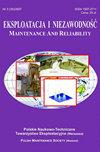考虑退化率变化的相型分布相依竞争失效过程可靠性建模
IF 3.1
3区 工程技术
Q2 ENGINEERING, MULTIDISCIPLINARY
Eksploatacja I Niezawodnosc-Maintenance and Reliability
Pub Date : 2021-08-27
DOI:10.17531/ein.2021.4.5
引用次数: 8
摘要
本文提出了考虑退化率变化的相型(PH)分布的依赖竞争失效过程(DCFP)系统可靠性模型。当持续退化和突然退化的总和超过软故障阈值时,就会发生软故障。连续两次冲击的到达间隔时间和硬失效前的总冲击次数分别服从连续PH分布和离散PH分布。采用PH分布生存函数计算硬失效可靠度。由于软失效过程中的冲击作用,软失效的降解率会增加。当冲击次数达到特定值时,退化率发生变化。硬失效分别采用极端冲击模型、累积冲击模型和运行冲击模型进行计算。结合软、硬失效可靠性模型,导出了闭式可靠性函数。最后,一个微机电系统(MEMS)验证了该模型的有效性。本文章由计算机程序翻译,如有差异,请以英文原文为准。
Reliability modeling for dependent competing failure processes with phase-type distribution considering changing degradation rate
In this paper, a system reliability model subject to Dependent Competing Failure Processes (DCFP) with phase-type (PH) distribution considering changing degradation rate is proposed. When the sum of continuous degradation and sudden degradation exceeds the soft failure threshold, soft failure occurs. The interarrival time between two successive shocks and total number of shocks before hard failure occurring follow the continuous PH distribution and discrete PH distribution, respectively. The hard failure reliability is calculated using the PH distribution survival function. Due to the shock on soft failure process, the degradation rate of soft failure will increase. When the number of shocks reaches a specific value, degradation rate changes. The hard failure is calculated by the extreme shock model, cumulative shock model, and run shock model, respectively. The closed-form reliability function is derived combining with the hard and soft failure reliability model. Finally, a Micro-Electro-Mechanical System (MEMS) demonstrates the effectiveness of the proposed model.
求助全文
通过发布文献求助,成功后即可免费获取论文全文。
去求助
来源期刊

Eksploatacja I Niezawodnosc-Maintenance and Reliability
ENGINEERING, MULTIDISCIPLINARY-
CiteScore
5.70
自引率
24.00%
发文量
55
审稿时长
3 months
期刊介绍:
The quarterly Eksploatacja i Niezawodność – Maintenance and Reliability publishes articles containing original results of experimental research on the durabilty and reliability of technical objects. We also accept papers presenting theoretical analyses supported by physical interpretation of causes or ones that have been verified empirically. Eksploatacja i Niezawodność – Maintenance and Reliability also publishes articles on innovative modeling approaches and research methods regarding the durability and reliability of objects.
 求助内容:
求助内容: 应助结果提醒方式:
应助结果提醒方式:


